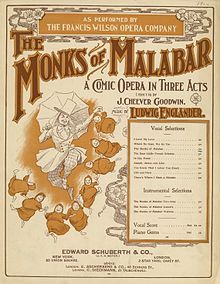Background
By the early 1890s, Francis Wilson had already developed a reputation as being an expert comedian. However in the years prior to 1900, Wilson had experienced a few unsuccessful shows. He appeared in a burlesque of Cyrano De Bergerac in September 1899 in which he played the title character. It was not well received and closed in less than a month.
Already in 1897, he completed an early version of a story he called Bouloo Boulboom in which he would play the title character in broad comic style to show off his comic talents. [2] The completed first draft of the manuscript is dated November 23, 1897. The following year he lent it to J. Cheever Goodwin, who made alterations and wrote lyrics. [3] Rather than repeat the failure of his previous plays such as the burlesque on Cyrano, Wilson set his story in an exotic location, providing many opportunities for broad characterizations and attractive settings. [4] By the time of the first performance, the title was changed to the more recognizable Monks of Malabar. Credits for the play always listed J. Cheever Goodwin as the author; there was no mention of Wilson's authorship with the exception of his ad libbing from the stage.
Plot
Act 1: Under the Taj-Mahal in Malabar. Boolboom has fled from France to India to escape the vixenish temper of Anita Tivoli to whom he was engaged to be married. As the story opens, Boolboom has prospered as a merchant in ivory and is about to wed a native woman Tata-Lilli ("Hail the Groom, Hail the Bride"). Cocodilla enters and speaks about a wife's obligation to her husband ("Where He Goes, We Go Too"). Boolboom and the monks of Malabar confirm the customs ("The Monks of Malabar"), although Boolboom is not beyond flirting with Daru ("The Dear Little French Grisette"). Anita then puts in a very unexpected and unwelcome appearance ("In Gay Paree"). She obliges Boolboom to wed her ("Joseph, James and John"), but he determines to avail himself of "Article 213" should Anita's temper again become unbearable. Article 213 is an East Indian law obliging a woman to be burnt within 24 hours of when her husband dies. The act ends with Boolboom marrying Anita ("Go On and Marry!").
Act 2: Inside the Maharajah's Palace of Pearls. People await the arrival of the Maharajah ("With Keen Anticipate"). He enters and describes his beneficent ruling ("Hear! Hear!"). Zizibar confess her/his deep love for Cocodilla ("You Know That I Adore You"). With Anita proving incorrigible, Boolboom plans to feigns his death ("From Very Earliest Infancy"). To prevent Anita being burnt, Boolboom writes to his friend the Nabob of Malabar, asking him to sees that she gets safely away to France. The Nabob, being in love with Anita, does not carry out Boolboom's wishes ("On My Trim Built Craft"). Boolboom argues ("Then, If I Understand Right") and leaves to feign his death by having been devoured by tigers. The Nabob rescues Anita en route to the funeral pyre, hoping that her gratitude will turn into love ("No More Weighted Down By Sorrow" - Act 2 finale).
Act 3: Inside the Maharajah's Palace of Domes. Zizibar, Cocodilla, Zoloe and Djelma summarize the turn of events ("Ha! Ha! Ha! Ha! Ha! Ha!"). The servants present themselves to the Nabob for inspection ("Here We Are Sir"). Boolboom returns disguised as a monk but is surprised to find Anita not just alive but now being courted by the Nabob. He disguises himself again as a servant in order to separate Anita from the Nabob ("You assert that you adore me"). Additionally, Boolboom inspires the women to revolt against Article 213. He is so successful that he induces the Maharajah to sell Anita to the highest bidder. He makes a great struggle to purchase her, but is outbid by the Nabob. After much difficulty, he succeeds in rescuing Anita, and gets safely back to France with her ("Finale act 3").
Reception
Criticism leveled at The Monks of Malabar ranged from muted appreciation to distaste. William Raymond Sill wrote in the New York Evening World : "Theatrical history will probably record "The Monks of Malabar" as a qualified success. It is one of those affairs insufficiently bad to be wholly condemned and insufficiently good to be wholly praised. As presented at the Knockerbocker Theatre last night it struck me as being absolutely nebulous. I have reason to consider my premises well taken." [5]
All reviews found the acting of the headliner, Francis Wilson, to be the operetta's most rewarding aspect.
Most reviewers found Englander's music acceptable but not very original:
"Mr. Englander's music, while often trivial, has a certain amount of sparkle and a good deal of rhythmic swing; it is more than a credible achievement, especially when one considers the text to which it had to be fitted." [6]
Ludwig Englander has not aimed directly at either art or originality, but he has touched the one and arrived at the other in several of his numbers. His music is tasteful, melodious and vivacious. The orchestration is remarkable in skill and the whole matter is spirited. [7]
"In the music he has written for the piece, Mr. Englander has been uncommonly successful and has developed a certain brightness, lightness and sparkle that none of his previous music would have led one to suspect him capable of. Mr. Englander has always been one of the most strenuous advocates of the bass drum, and, like all ardent partisans, has rather overworked that honorable instrument. In this last piece, he has restrained himself nobly, and although at times he makes "the little old man in the tinshop": work very hard, he gives him many breathing spells. [2] "Music and Opera," (unidentified newspaper), Clipping File, Billy Rose Theatre Division.</ref>
"Mr. Englander was not moved by a high ambition when he wrote this score. He was trying to make his tunes to fit his words and he succeeded. There are some numbers which have clearly marked rhythmic effects, and most of them have very familiar melodic foundations. They may serve to please those who do not like anything too new in the musical line." [8]
"Mr. Englander's music is far superior to Mr. Goodwin's book. It is full of melody and rhythm, and some of the numbers--notably the finales--are well built and well adorned in the orchestration. Mr. Englander's music is far superior to Mr. Goodwin's book. It is full of melody and rhythm, and some of the numbers--notably the finales--are well built and well adorned in the orcehstration. One of the songs, "Joseph, James and John" is of sufficient musical attractiveness to make its popularity probable. [9]
The play came in for harsh reviews:
"Mr. Goodwin can write dialogue and lyrics of this type about as well as any other hack writer of librettos, and it may be said that the talk and the verses of the songs in the new book are made in the old familiar way. It may also be said that neither the man about town nor the authors of the best of our short stories will be deeply moved by this book. The intellectual lower middle classes may be amused by it, and if there are enough of them, Mr. Wilson may make money. But it is probably that his harvest will be in countries less near the centres of civilization than New York. The plot of the operetta is not bad, but it fails to develop the expected hilarity, and except for a few humorous lines of Mr. Wilson's own, there is not much to laugh at. [8]
"The Monks of Malabar is as light as a toy balloon, and as a means of diversion it is no less childish. The operetta floats along as blithely and it is as pleasing in color as the toy balloon, but it has not its symmetry. In construction the libretto is pitifully crude. There is not a well devised entrance for any one of the characters, and the single attempt at a dramatic situation is made in the third act...The plot is so well hidden that if one attempts to follow it he misses the attractive features of the extraneous detail. There is little food for laughter in the complications of the story as it is set forth, and the only humor to bge detedcted lies in the individual lines...The desert wastes of dialogue were occasionally broken by musical numbers that were, in the main, very pleasing; and the tediousness of the performance was relieved somewhat by the charming spectacle presented by the scenery and costumes." [9]

Otto Abels Harbach, born Otto Abels Hauerbach was an American lyricist and librettist of nearly 50 musical comedies and operettas. Harbach collaborated as lyricist or librettist with many of the leading Broadway composers of the early 20th century, including Jerome Kern, Louis Hirsch, Herbert Stothart, Vincent Youmans, George Gershwin, and Sigmund Romberg. Harbach believed that music, lyrics, and story should be closely connected, and, as Oscar Hammerstein II's mentor, he encouraged Hammerstein to write musicals in this manner. Harbach is considered one of the first great Broadway lyricists, and he helped raise the status of the lyricist in an age more concerned with music, spectacle, and stars. Some of his more famous lyrics are "Smoke Gets in Your Eyes", "Indian Love Call" and "Cuddle up a Little Closer, Lovey Mine".

Henry Louis Reginald De Koven was an American music critic and prolific composer, particularly of comic operas.
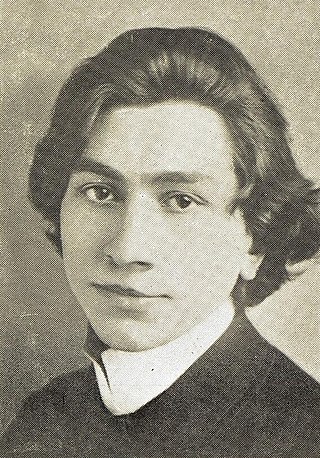
Charles Rudolf Friml was a Czech-born composer of operettas, musicals, songs and piano pieces, as well as a pianist. After musical training and a brief performing career in his native Prague, Friml moved to the United States, where he became a composer. His best-known works are Rose-Marie and The Vagabond King, each of which enjoyed success on Broadway and in London and were adapted for film.
Howard Lindsay, born Herman Nelke, was an American playwright, librettist, director, actor and theatrical producer. He is best known for his writing work as part of the collaboration of Lindsay and Crouse, and for his performance, with his wife Dorothy Stickney, in the long-running play Life with Father.
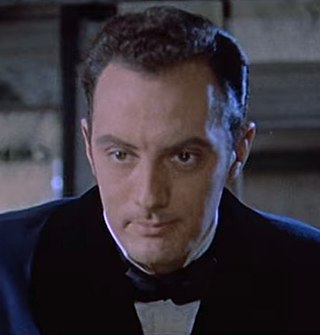
Francis Matthews was an English actor, best known for playing Paul Temple in the BBC television series of the same name and for voicing Captain Scarlet in Captain Scarlet and the Mysterons.

Basil Willett Charles Hood was a British dramatist and lyricist, perhaps best known for writing the libretti of half a dozen Savoy Operas and for his English adaptations of operettas, including The Merry Widow.

Francis Wilson was an American actor.
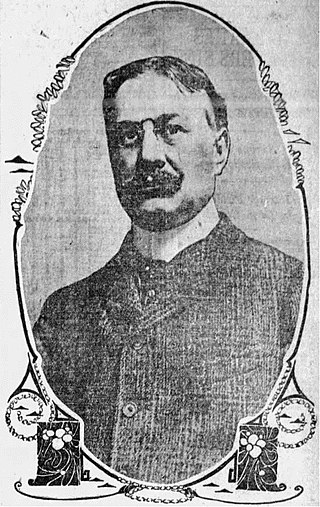
Gustave Adolph Kerker, sometimes given as Gustav or Gustavus Kerker, was a German-born composer and conductor who spent most of his life in the United States. He became a musical director for Broadway theatre productions and wrote the music for a series of operettas and musicals produced on Broadway and in the West End. His most famous musical was The Belle of New York (1897).
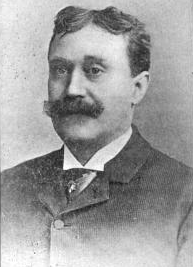
Edward Everett Rice was an American musical theatre composer and producer active during the late 19th and early 20th centuries, known as a pioneer of American musical theatre, who introduced to Broadway Clorindy, a musical by African-American writers with African-American performers.

Panjandrum is a musical with music by Woolson Morse, words by J. Cheever Goodwin, written for and produced by the DeWolf Hopper Opera Company. It opened on May 1, 1893, at the Broadway Theatre in New York and closed at the end of September 1893.
Lost, Strayed or Stolen is a musical comedy in four acts with music by Woolson Morse and words by J. Cheever Goodwin, adapted from the French farce Le baptême du petit Oscar by Eugène Grangé and Victor Bernard. The story concerns a missing child and its nursemaid, three competing potential godfathers and an opera diva.

Henry Woolson Morse, usually credited as Woolson Morse, was an American composer of musical theatre. Often working with librettist J. Cheever Goodwin, he produced several scores for Broadway productions in the 1890s.
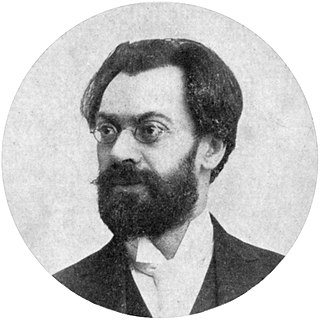
Ludwig Engländer was an Austrian-born American composer of more than 30 musicals.

Leave It to Jane is a musical in two acts, with music by Jerome Kern and book and lyrics by Guy Bolton and P. G. Wodehouse, based on the 1904 play The College Widow, by George Ade. The story concerns the football rivalry between Atwater College and Bingham College, and satirizes college life in a Midwestern U.S. town. A star halfback, Billy, forsakes his father's alma mater, Bingham, to play at Atwater, to be near the seductive Jane, the daughter of Atwater's president.

Adele Ritchie was an American prima donna of comic opera and star of Edwardian musical comedies and vaudeville. Her career began in the early 1890s and continued for nearly twenty-five years. She killed a friend, then herself in a murder–suicide.

Marie Jansen was an American musical theatre actress best known for her roles at the end of the 19th century. She starred in a number of successful comic operas, Edwardian musical comedies, and comic plays in New York, Boston, Philadelphia and London during the 1880s and 1890s.
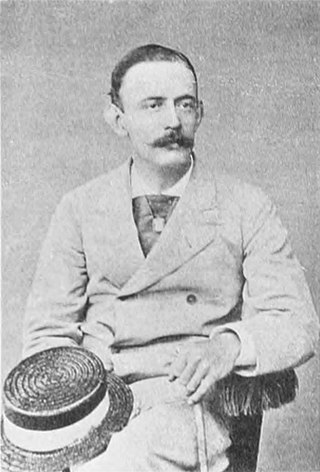
John Cheever Goodwin was an American musical theatre librettist, lyricist and producer. Goodwin was born in Boston and graduated from Harvard University. He began a career in journalism before turning to writing for the stage. Early in his theatrical career he worked for Alice Oates, acting in her company and translating French opera bouffe into English for performance by her company. He often worked with composers Edward E. Rice and Woolson Morse. Goodwin was one of the earliest American writers dedicated to musical theatre librettos and lyrics. His first successful libretto was Evangeline in 1874, and his last new work was produced in 1903.

Frederick Rosse was an English composer of light music and operetta. After studying music in Germany and elsewhere, he began his career as a musical director at London theatres. He composed suites of incidental music for several plays, orchestral suites and songs. His "Doge's March" from his music for The Merchant of Venice was his most enduring piece.

The Oolah is an 1889 comic opera which starred Francis Wilson and Marie Jansen on Broadway.
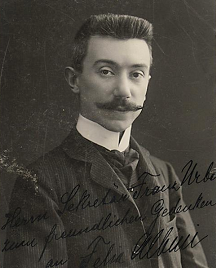
Srećko (Felix) Albini was a Croatian composer, conductor, and music publisher. He was primarily known for his operettas, some of which were adapted into English and performed in London and New York.
